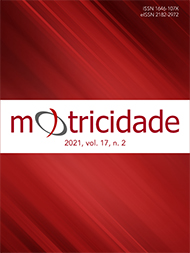Cardiovascular responses in elderly hypertensive women after a resistance exercise session with different movement speeds
DOI:
https://doi.org/10.6063/motricidade.20808Abstract
The aim of the present study was to analyze the acute effect of a resistance exercise session on cardiovascular and perceptual responses using the slow movement speed compared to the traditional movement speed in hypertensive elderly women. Experimental research was carried out with eleven elderly women (66.5± 4.8 years) active and with medication-controlled hypertension in the city of Tabuleiro do Norte, Ceará, Brazil. The elderly women were randomly submitted to a RE session with 60% of 1 RM with slow movement speed or traditional. Systolic blood pressure, diastolic blood pressure, heart rate, mean blood pressure, and double product were measured before exercise and after sessions for one hour. The post-exercise analysis showed a more marked reduction in systolic blood pressure, heart rate, mean blood pressure, and double product values (p< 0.05) in slow movement speed compared to baseline values, however, there were no significant differences in post-exercise hypotension between contraction speeds (p> 0.05). Differences were found in the rating of perceived exertion (p= 0.007). Slow movement speed and traditional movement speed promoted post-exercise hypotension in elderly hypertensive women on medication.
Keywords: aging, resistance training, post-exercise hypotension, hypertension
Downloads
Published
Issue
Section
License
The authors of submitted manuscripts must transfer the full copyright to Journal Motricidade / Sílabas Didáticas Editions. Granting copyright permission allows the publication and dissemination of the article in printed or electronic formats, and copyrights start at the moment the manuscript is accepted for publication. It also allows Journal Motricidade to use and commercialise the article in terms of licensing, lending or selling its content to indexation/abstracts databases and other entities.
According to the terms of the Creative Commons licence, authors may reproduce a reasonable number of copies for personal or professional purposes, but without any economic gain. SHERPA/RoMEO allows authors to post a final digital copy (post-printing version) of the article on their websites or on their institutions' scientific repository.


